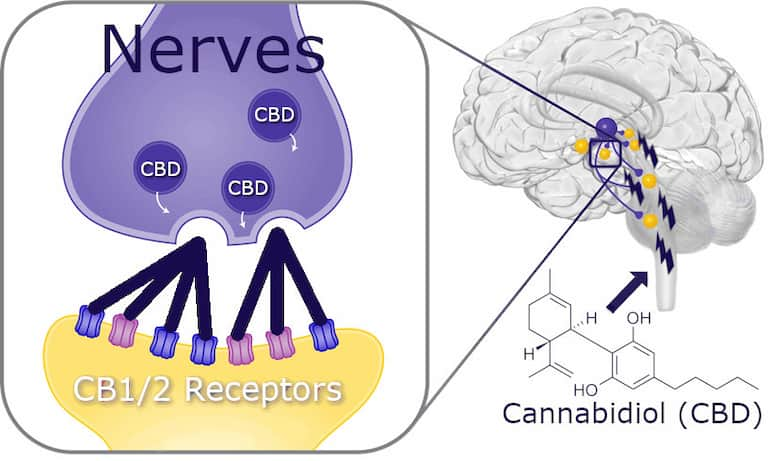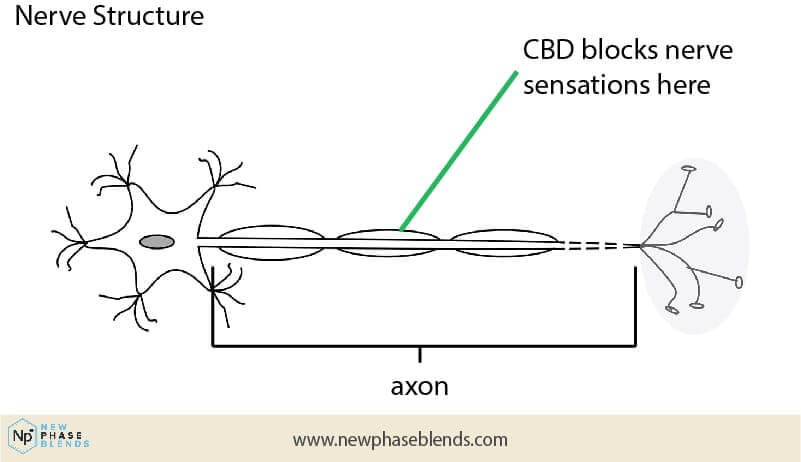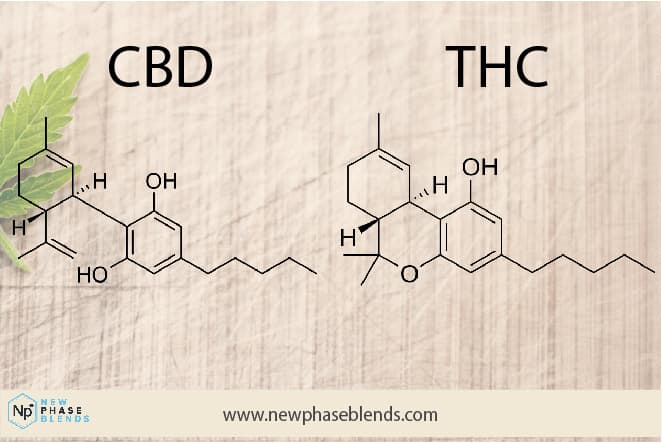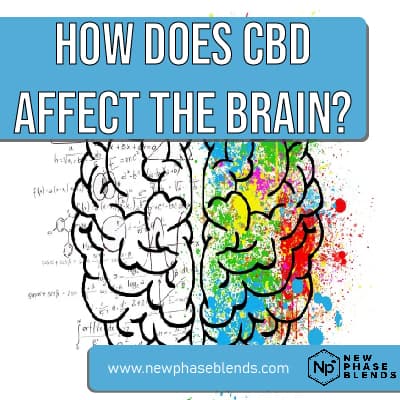CBD, or cannabidiol, is one of many natural plant chemicals found in cannabis. It’s most commonly used for its beneficial health effects that don’t result in getting you high. CBD oil can be used to treat a variety of ailments, like anxiety, chronic pain, and inflammation. We know CBD affects the brain in many ways but how does CBD affect the brain exactly? What does CBD do to the brain?
TL;DR – Cannabidiol (CBD) works with the body’s endocannabinoid system receptors located within the brain (and other parts of the body). These regulate various functions. CBD also binds to serotonin receptors, which can help reduce anxiety and improve mood.

The Complexity of CBD’s Effects on the Brain
CBD is a complex molecule that is not fully understood. It’s a cannabinoid, but unlike THC, it doesn’t produce psychoactive effects. Instead of getting you high and stoned, CBD can be used to help with sleep and pain management, as well as anxiety and depression—all without any serious side effects or risk of addiction.

CBD also has antioxidant properties: when it enters your body, it promotes detoxification processes in your liver; it may even protect against brain damage caused by strokes or other diseases like Alzheimer’s disease!
There are a lot of things we still do not know about how CBD works, though. Since being legalized, studies on all different types of cannabinoids (not just CBD) have begun.
What Does CBD Do to the Brain?
CBD’s effects on the brain stem and spinal cord are also important. These regions control our respiration, heartbeat, and blood pressure. If you’re feeling light-headed after taking CBD, this may be due to its effects on these parts of the body.
CBD is known for its anti-inflammatory properties, which help reduce pain caused by inflammation. Many users report that CBD reduces the symptoms of arthritis and other forms of joint pain when taken regularly over time—but what’s actually happening inside your body?
The answer lies in how nerve cells in your brain communicate with each other via sodium channels (sodium is an element found in salt).

When a neuron receives an electrical signal from another neuron, it triggers calcium channels to open up—this causes ions like calcium to rush into the cell through ion pumps located on its membrane surface.
This causes a chain reaction wherein more ions rush into neighboring cells until they reach their maximum capacity, which creates an electrical current that travels down axons (which are bundles of nerves) all the way to where they end at synapses (junction points between neurons).
Related: Using CBD for Bipolar Disorder
Did you know that studies revolving around the imaging of neurons show that CBD causes some very big changes in brain activity and connectivity patterns? These neuroimaging studies were conducted during both states of rest, and while performing cognitive tasks.
How Does CBD Work in the Brain?
Related: The Endocannabinoid System
CBD affects what is known as the BOLD signal. The BOLD signal stands for blood oxygen level-dependent, and it is a technique used to measure brain activity. It uses the blood oxygen level in the brain as an indicator of neural activity because neurons use more oxygen when they fire than they do when they are quiet.
This means that by measuring changes in blood flow and oxygenation levels, you can determine whether or not a certain part of your brain is active.
The BOLD signal has also been used with other types of imaging techniques to measure things like neural responses to stimuli or mental tasks—so it’s not just about measuring overall activity levels!
This can be pretty handy if you want to know how something affects your brain! For example: Say you’re doing something fun (like playing video games) and notice that your heart rate goes up faster than normal.
This could mean that the game is exciting enough that it activates some strong emotions within you (and then maybe even leads them onto social media).
It Can Reduce Anxiety
CBD may help relieve stress, regulate blood sugar, and enhance a person’s overall sense of well-being. Moreover, CBD is a relatively inexpensive alternative therapy and has many benefits. If taken regularly, it can help people overcome anxiety and depression.
Moreover, CBD can be used along with other therapies, including psychotherapy.
CBD reduces anxiety by inhibiting the signaling pathways between the amygdala and the hippocampus. This area controls the response of the body to fear-based memories. It can also stimulate the repair of brain cells.
It Can Help With Depression
Depression, anxiety, and PTSD are all conditions that CBD can help relieve.
Depression is among the most common mental health issues in the United States. According to a report from the National Institute of Mental Health (NIMH), about 16 million adults in America suffer from major depressive disorder every year. It’s also estimated that 50% of those affected do not seek treatment for their condition—leading to higher rates of suicide than seen among those who do seek help.
Related: CBD for Those Struggling With PTSD
While there are many conventional drugs for depression available on the market today, these medications often come with significant side effects and may take weeks or months before they start working effectively.
CBD has been shown to be more effective than pharmaceutical drugs at easing symptoms and reducing inflammation in your brain without causing any serious side effects whatsoever.
What’s more? Research has demonstrated that CBD interacts with serotonin receptors in your brain which makes it an excellent natural option for treating depression without compromising your daily activities or health.
It helps with sociability, emotions, and cognition
In recent studies, CBD has been found to be beneficial in reducing anxiety during public speaking, and its effects were even more pronounced than placebo. Several studies have demonstrated that CBD helps to prevent the onset of SAD symptoms, including decreased anxiety.
All things aside, more research is needed before it can be used to treat the disorder. The best way to find out whether CBD can help SAD patients is to conduct a controlled trial to determine how much the drug should be administered to each individual.
How Long Does CBD Affect the Brain?
Related: How Long Does CBD Last?
CBD has a half-life of roughly 1-2 days in humans. A half-life is the amount of time a substance takes to decrease, by half.
That said, most people report feeling the effects of CBD for about 4-6 hours, depending on the type of CBD used and their physiological make up. CBD will continue to affect the brain after this 4-6 hour period, but it will probably go unnoticed by you.
Common Questions Relating to Your Brain and CBD
Does CBD Hurt Your Brain?
CBD does not hurt your brain. In fact, CBD is considered safe by many organizations, including the World Health Organization. While CBD may alter some of the way nerve signals are conducted, it does not necessarily hurt anything within our brain, or body.
Does CBD Cause Memory Loss?
No, CBD does not cause memory loss. This is a common misconception due to the fact that THC, or tetrahydrocannabinol, can cause short term memory loss. People assume that since CBD is contained in cannabis, it can cause similar intoxicating effects like THC does.

This is not true at all. In fact, most people choose CBD over THC because they will not get high.
Can CBD Oil Change Your Personality?
It is not possible for CBD to change your personality. However, if someone were to be easily agitated or depressed due to excessive pain or anxiety, there is a likelihood CBD use can help their mentality since it helps lower discomforts associated with pain and anxiety.
Summary – How does CBD affect Your brain?
As you can see, there are many ways that CBD affects our brain. It is clear that this compound has many potential benefits for those suffering from mental health issues. As more research continues to be done on the topic, we will likely find even more uses for this substance in helping us cope with depression and anxiety as well as other conditions like PTSD or Alzheimer’s disease.

CBD may be more effective for treating mental health disorders like anxiety than traditional antipsychotics. Also, because it’s not a controlled substance and doesn’t produce a strong high like THC, CBD is perceived as safer and less controversial than marijuana.
Its many uses in the medical field make it an especially attractive treatment option—particularly when compared to prescription drugs.
References
https://www.ingentaconnect.com/content/ben/cpd/2012/00000018/00000032/art00018
https://www.ncbi.nlm.nih.gov/pmc/articles/PMC8465134/
https://www.ncbi.nlm.nih.gov/pmc/articles/PMC4189631/
https://www.frontiersin.org/articles/10.3389/fphar.2020.618184/











